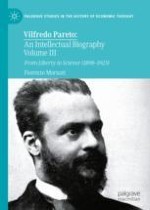2020 | Book
Vilfredo Pareto: An Intellectual Biography Volume III
From Liberty to Science (1898–1923)
Author: Prof. Fiorenzo Mornati
Publisher: Springer International Publishing
Book Series : Palgrave Studies in the History of Economic Thought Series
